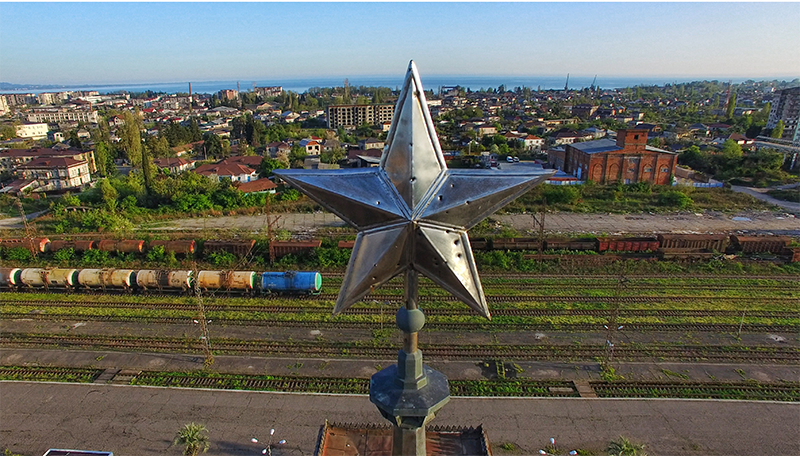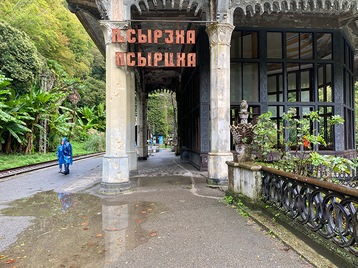In the world of cryptocurrency, there is only one question that matters: ‘Is the cost of electricity less than the value of what I am mining?’ Once the initial setup has been paid for, it is this margin that makes their business possible.
In Abkhazia, cryptominers have found virtually free electricity, making mining viable even when crypto prices crash. But, for the people of the small breakaway state, there’s another cost entirely.
Tense geopolitical and cultural conflicts dating back decades are being stoked by an influx of cryptominers, who are siphoning off power from a crumbling dam that lies directly in the middle of an uneasy and unofficial border. Their presence risks upsetting an already fragile peace.
This feature appeared in Issue 44 of the DCD Magazine. Subscribe for free today
Understanding Abkhazia
To most of the world, Abkhazia is not a country.
"It was an autonomous region that was part of Soviet Georgia. Large parts of the population ideally wanted to stay in the Soviet Union, but when that broke up [in 1991] they felt they had no place in independent Georgia,” explained Thomas de Waal, senior fellow with Carnegie Europe and author of several books on the region, including The Caucasus: An Introduction.
“They had links to Russia, and they also identified Georgia as an oppressive place for them, because of all the history - including when Tbilisi suppressed their language and culture and forced them to switch to the Georgian script in the 1930s.”
In its heyday, when its Sukhumi region was favored by Stalin and the elite, Abkhazia was billed as ‘Soviet Florida,’ and saw an influx of immigration from Georgia. By the time of the collapse, “Georgians were about just under half the population, the Abkhaz were about 20 percent, and then the others were lots of Russians, a lot of Armenians, and some Greeks - so it was a very mixed population.”
Georgians had the demographic claim as the largest group, as well as the legal claim to the land, which had been split along Soviet Republic lines. “It was this incredibly naive political culture in which people believed that all you had to do was just declare independence and paradise would begin,” de Waal recalls.
“But there were a lot of criminalized armed groups who were ready to fight over all the resources. The Russian military and Soviet military were suddenly impoverished and had tons of weapons to show around and many of them were happy to fight on the Abkhaz side against the Georgians. It was just lots and lots of ingredients for conflict, which eventually, unfortunately, did break out in 1992.”
The Georgians won the first wave of the civil war, taking over Sukhumi. But then the Abkhaz sought help from Russians and Chechnians, turning the tide in their favor. “Ninety percent of the 200,000 plus Georgians were either driven out their homes or fled of their own accord,” de Waal explained.
“You ended up with Abkhazia suddenly losing pretty much all of its Georgian population, who lived in terrible conditions in Georgia-proper - some of them still don't own their own houses 30 years after the conflict,” he said.
It is not known how many Georgians died in the ethnic cleansing, but thousands were killed by the Abkhaz and Russian forces. Others were sexually assaulted amid widespread war crimes and human rights abuses.
“Abkhazia was sanctioned and isolated pretty much since then, until 2008 when Russia recognized it,” de Waal said. “Now it has a whole new set of problems from Russia.”
The Enguri Dam
After the conflict, the border line between Abkhazia and the rest of Georgia went partly along the Enguri river, putting the world's second-highest concrete arch hydroelectric dam in a disputed zone. Part of the Enguri Dam lives in Georgia, while the powerhouse is found in Abkhazia, requiring cooperation for the plant to work.
Despite the continuing tensions, both sides have agreed to a truce of necessity around the dam, which provides a huge portion of the electricity for both regions. As part of the 1997 ceasefire agreement, Abkhazia gets around 40 percent of the energy generated by the 1,320MW power station - virtually for free.
That arrangement worked for years, with Abkhaz locals nominally charged a tiny $0.005 per kilowatt-hour in Abkhazia (compared to Georgia's $0.08 per kWh). In practice, most residents lack electricity meters or any effective way of tracking usage, and the small costs are primarily covered by the Abkhaz government.
“For the first 15 years, that was sufficient, it was enough to keep everything in Abkhazia going,” Prof. Dr. Theresa Sabonis-Helf, chair of Georgetown University's Science, Technology and International Affairs program, said. “And then in 2016, demand started going up,” with Abkhaz consuming more than its allotted 40 percent.
Both the Georgian government and the de facto Abkhaz government didn't really understand what was going on, she said. “Then they realized that it was crypto.”
Sukhumi remains a popular resort for Russians. “A lot of young crypto entrepreneurs went there," Sabonis-Helf said. “Particularly because Russia regulates cryptocurrency, while Abkhazia has no capacity to do that. They discovered that they can rent beach houses and get cheap electricity for crypto, without regulation.”
In the story of this crypto power surge, the shadow of Enguri looms large. Opened in 1978, it has been left in a state of disrepair for decades, slowly deteriorating after years of neglect.
The European Bank for Reconstruction and Development (EBRD) and others launched a 15-year emergency renovation project in 1996, implementing critical fixes that staved off total collapse. The effort appeared set to restore the dam to its former glory.
Then war broke out.
The Russian invasion
On 8 August 2008, after escalating tensions, Russia invaded Georgia, taking sides with South Ossetia, another separatist territory that is internationally regarded as a part of Georgia. A day later, Abkhaz forces opened a second front, attacking the Kodori Gorge, the only part of Abkhazia then under Georgian control.
The conflict was brief, but pushed the two breakaway regions closer into Russia's orbit. Following the ceasefire of 12 August, Russia kept troops in both regions, recognizing them as independent states. Georgia maintains that they are both Russian-occupied Georgian territories.
For Enguri, this presented a problem. Georgia did not want to be seen to be investing and working with an entity it did not recognize as legal. Six months after the war it entered into a secret agreement with Russia to manage Enguri, but the deal was leaked - drawing public furore in Abkhazia. The deal was scrapped, slowing work.
In the meantime, with so much power sent to Abkhazia for free, USAID estimates that the dam only brings in about 50 percent of the revenues required to sustain operations and repairs. It still relies on donors and cooperation, both of which can be fickle.
Last year, the hydropower plant had to be shut down for more than three months for repairs. Russia stepped in to supply Abkhazia with energy, for a price.
"The grid in Abkhazia was already crashing before the shutdown due to crypto, so the de facto government put in a ban," Sabonis-Helf said.
It has had a limited effect, with Russian nationals splashing cash around in Sukhumi, widespread rumors of politicians running their own crypto farms, and the lack of metering making it hard to track such sites.
Around the same time as the ban, the price of Bitcoin happened to surge - so mining actually increased. By 2020, roughly 30 percent of power used in Abkhazia was believed to go to cryptomining.
Mining at gunpoint
It’s also hard for the authorities to actually do anything if mining is suspected. “USAID approved me going across the border and spending a day with the (now former) de facto Minister of Energy,” Sabonis-Helf said.
“He was quite adamant that if we're going to cut people off, for any reason, we have to be able to do it remotely. Abkhaz households are all heavily armed, and they can't find any low-level electricians who are willing to go and cut people off in a place where they might get shot.”
Remote disconnects are not possible with Abkhazia’s antiquated grid. “The downside of the Enguri deal was that they've just had this drug of almost free electricity all these years, and they haven't sorted out their energy sector,” de Waal said.
The crypto ban has simply forced the practice further underground, which has mixed dangerously with the excess of guns. Last year, a man was killed during an attempted robbery at a cryptocurrency mining data center, after men defending their facility accidentally shot one of their own people.
Robberies at gunpoint and late-night burglaries have become increasingly common as mining is seen as a rare opportunity for wealth in a region with unemployment estimated at between 40-70 percent.
Locals, most of whom do not have enough money to cover the initial setup fees, are not the major beneficiaries of the crypto boom. Some may be operating small rigs, leased from others in a profit-sharing agreement, that they run at their homes.
But the larger facilities appear to primarily benefit Russian nationalists, as well as their local political backers.
Enter the oligarchs
"The owners of the largest crypto farms are those who are usually called the 'political elite,' regardless if they’re in power or in opposition," Inal Khashig, the Abkhaz editor of the Caucasus-based publication Jam News, said in an opinion piece.
"These 'managers,' periodically replacing each other, have long mastered the golden rule that the best business is one making profit off of the state."
This influx of investment appears linked to nodes of power within Russia.
"When oligarchs get connected to crypto, it becomes yet another way to asset strip from the state," Sabonis-Helf said.
While the Russian miners are making huge profits, that is not going back into the system. “They’re hosting big parties and doing the things that oligarchies do like spending money on the Black Sea coast while they vacation, but they’re not paying much in taxes,” she explained.
In fact, it’s quite the opposite: “The way they pay taxes is bizarre enough that it gives the appearance that the Abkhaz government is still subsidizing them, because when Abkhazia has to buy electricity from Russia, the price they pay is greater than the price that the crypto entrepreneurs pay in tariffs or taxes,” Sabonis-Helf said.
It’s not clear what the relationship between the Russian cryptominers and the state is, and how much tension or cooperation there is. What is clear, however, is that the Russian government sees it as an opportunity.
Not only are they benefiting from the current arrangement, but they also seek to consolidate their power by gaining a deeper involvement in Abkhazia’s grid.
Climate change raises tensions
Enguri faces another crisis, one imperiling us all: Climate change. Discharges and sediment content data are not routinely tracked, and hydro-meteorological data is limited, but water levels appear to be dropping.
"This presents a significant economic risk as it is expected that in the medium term Georgia will experience increased variability of hydrological patterns, whereas in a more remote future, more profound climate changes may materialize," the EBRD has warned.
Anecdotally, locals complain of less snowmelt, and signs that the water supplying the dam is being disrupted by a changing climate.
Between Enguri’s problems, crypto’s rising demands, and the other strains on Abkhaz’s grid, Russia sees itself as the salvation.
Russia's Gazprom is pushing to install a gas grid, and the government is offering to fix other, smaller hydropower facilities in Abkhazia, that were looted in the last war.
But such offers come with a price, one greater than simple financial transactions.
Terms of the deal are shrouded in secrecy, misinformation, and are subject to change. But last year Aslan Bzhania, the president of Abkhazia, said a new substation would be used to power “a technopark for cryptocurrency mining" after holding a summit with Russian partners.
Russia appears to have offered new energy supplies - which must be dedicated to crypto.
With power comes property
The country also wants another major concession: The ability for Russian nationals to buy property in Abkhazia.
For all its closeness to Russia, and the presence of 30 Russian military bases within its borders, Abkhazia is not a simple vassal state. Unlike South Ossetia, it does not wish to become a part of Russia.
"They're very eager to preserve some kind of autonomy,” Sabonis-Helf said. “So it's very difficult to buy land, and they have blocked the Russians from buying it. This has been a Russian ask for years, and now it's an ask on behalf of the crypto entrepreneurs.”
This time, they may get what they want. Enguri’s issues and the rise of crypto has put pressure on the local regime.
"With 20 years of no reform, grid crashes are relatively common, so people's expectations for outages are higher than most," Sabonis-Helf said, comparing it to Kazakstan, which saw widespread political unrest when the grid crashed following its own crypto boom after China's ban.
"But it's one thing to have some crashes, it's another thing to have the continuous crashes that they've seen,” she added.
The people versus crypto
Last year, local residents in the village of Duripsh seized a substation in anger at the outages. A few months later, a mob shut down local mining farms.
Sensing the change, President Bzhania - who was pro-cryptomining - enacted the ban, and said he was against the free-for-all approach currently crippling the grid. He also pledged to crack down on government officials that were themselves mining, but some claim he operates his own facilities, a rumor that has not been confirmed.
Giving Russia the ability to buy property and land as well as more control over the grid would help alleviate such tensions, but opens the door to Russia solidifying its power over the region.
"Russia has gotten increasingly sophisticated in the ways in which it uses energy as a weapon," Sabonis-Helf said. "And if Russia comes bearing any kind of energy gifts or infrastructure or crypto entrepreneurs, beware."
Such weaponization could also be turned on Georgia, she added. "Georgia is very adversely affected by shutting down the Black Sea, which if the Russians succeed in doing that, will do substantial damage to the Georgian economy."
Many in the Georgian government see Abkhazia as a puppet regime of the Russian state, even if Abkhazians would disagree.
The endgame
This fear has only been made worse by Russia's unprovoked invasion of Ukraine.
"You've got a new 'foreign minister' in Abkhazia who was straight from Moscow who did work in Donbas, so he's on the Western sanctions list," de Waal said.
"The majority of locals are in the Russian information space, and are likely supportive of Russia rather than Ukraine."
But, he added, "they still have this funny relationship with Russia, who is their big protector, patron, everything - and yet they still don’t want to be part of it."
What they want, however, may not be what happens, Sabonis-Helf fears: “I really do think that if you do any more asset stripping out of Abkhazia, you end up with systems that don't work at all, and then you have to turn to Russia to rebuild them. And now, Russia owns your grid.”




